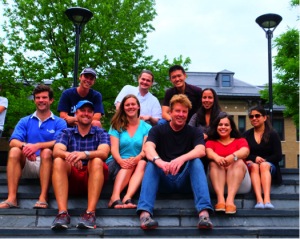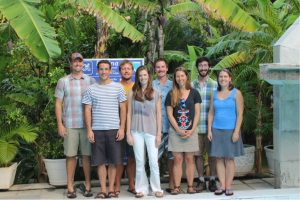OCB Postdoc Exchange!
A key objective of OCB is to train the next generation of ocean scientists and engage early career scientists in OCB and partner program meetings and training courses by providing travel and tuition support, networking, and mentoring opportunities.
Current and recent examples:
- GOOD-OARS Summer School, Penang Malaysia, November 4-11 2025. The school will be hosted by the Centre for Marine and Coastal Studies of Universiti Sains Malaysia (CEMACS) and is established under the Global Ocean Oxygen Decade (GOOD) and Ocean Acidification Research for Sustainability (OARS) programmes of the UN Ocean Decade. It aims to train the next generation of ocean oxygen and acidification scientists and researchers in the foundations of both fields, with instruction and lectures from world experts in a friendly setting for discussion.
- Annual OCB summer workshop
- OCB scoping workshops
- Gordon Conference in Chemical Oceanography
- IMBeR IMBIZO Meetings (odd years)
- IMBER ClimECO Summer Schools (even years)
- SOLAS Summer Schools
- International Ocean Colour Coordination Group (IOCCG) Lecture Series
- International Ocean Colour Science Meeting (IOCS)
- Cornell Satellite Remote Sensing Course
- Univ. Maine Ocean Color Remote Sensing Course
- Training courses on ocean acidification
- Training courses on biogeochemical sensors
While we do not entertain individual requests for travel support, early career support is a high priority of bulk travel support requests submitted to OCB (see below for current opportunities). OCB strives to highlight the work of students and postdocs at its meetings and provide opportunities for interacting with federal agency managers and other scientists. OCB also maintains an early career position on its Scientific Steering Committee (SSC).
Early Career Opportunities & News
- Core Fulbright U.S. Scholar Program
- Young Earth System Scientists community
- View our Jobs & Postdocs page for current openings
- View our Student Opportunities page for undergraduate, MS and PhD listings
Pathways to Science: Early Career Fellowships & Scholarships
Recommended resources
OCB-sponsored participants of the Cornell Satellite Remote Sensing Course held in June 2016 in Ithaca, NY. Emily Bockmon studies carbonate chemistry in the ocean, focusing on best practices for measurement and calibration of instrumentation. In 2014, she completed her PhD at Scripps Institution of Oceanography where she is currently she is working as a researcher. Next […]
Read MoreThird IOCCG Summer Lecture Series 2016: Frontiers in Ocean Optics and Ocean Colour Science July 18-30, 2016 in Villefranche-sur-Mer, France Mike Sayers is a 2nd year PhD student at Michigan Tech University and a research scientist at the Michigan Tech Research Institute (MTRI), where his research has been focused on the use of bio-optical remote […]
Read MoreOCB-sponsored participants of IMBER ClimECO5 in August 2016. Tayler Clarke completed her MSc at the University of Costa Rica in 2013. Her master’s thesis focused on the spatial distribution and reproduction of shark and ray bycatch in shrimp trawl fisheries. Currently, she is a second year PhD student in William Cheung’s lab at the […]
Read More- « Previous
- 1
- 2






